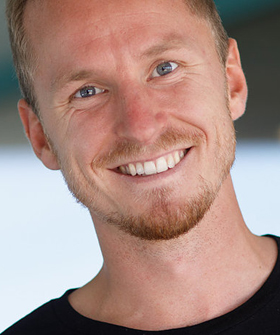|
lot of money for anyone to plunk
down on a domain name, especially when they aren't yet
sure exactly what it will be used for. To find out
exactly who this extraordinary European
entrepreneur/aspiring philanthropist is and what
motivated him to go all in on Great.com we
connected with Erik to get the inside story.
"Iím
from Sweden, a small town called JŲnkŲping
and I was born on the 11th of February 1988," Bergman
began. "I was raised in a very normal Swedish
family, a family that I believe fit pretty much all
expectations of a Swedish family that non-Swedes might
have (at least what I think they have). Very caring,
really organized and generally engaged in the world
problems. I care a lot about the people around me and
I want to put as many smiles on faces as I possibly
can."
Bergman
said the most vivid memories from his youth go back to
evening conversations his family had at the dinner
table. "My family was pretty much always talking
about what was wrong in the world. The conflict
between Israel and Palestine, the global
warming, whatever epidemic was haunting the planet at
the moment. The dinner table was a serious place
for me. To contrast this, I remember my first dinners
at my fiancťe's house. She has three sisters and at
the dinner table, pretty much the only thing you can
hear, is giggle. It took me years to accept
that this was a way of eating together as well. Over
time Iíve grown the really appreciate all the focus
on whatís fun and joyful rather than whatís deep
and worrying."
Here
is a recent - and perfect - example of Bergman's fun
and joyful approach to life. The top photo is Erik
and his brother as kids. A few days ago, to
celebrate their mother's birthday, the boys got
together to pose for a new photo they wanted to
surprise her with (the 2nd photo below).
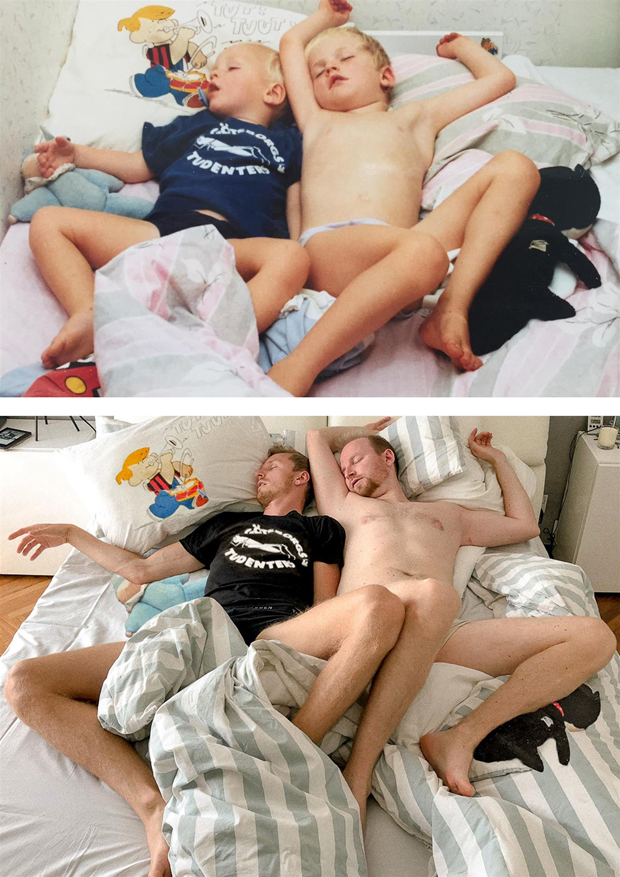
Some
might say that's a photo only a mother could love but
the attention to detail tells you
a lot about why Bergman has been a success in the
business world as well as his family life.
Bergman's appreciation for the
fun side of life today may stem from some childhood
years that weren't as joyful. "School was
a pretty rough time for me," Bergman recalled.
"Especially the first years
between ages of 7-13. I wouldnít say that I was
bullied but the other kids werenít always that nice
and if I should use one word, I would say that I was
lonely. I didnít have many, if any, friends to hang
out with on a regular basis."
Things
finally changed when Bergman was 13 years old and
moved to a new school. "The school I had changed
to was the ďrich schoolĒ in my town and we were a
very ordinary family," Erik noted. "I had
everything I needed but I had a lot less than the
other kids so this made me feel like a poor kid! I was
desperate to fit in so money and fashion labels
became very important to me so I could reach my goal
of fitting in." At first, putting superficial things
worked and Bergman suddenly became one of the popular kids
overnight, so he doubled down on that path.
"At
17 I started playing online poker and at 18 I
got really good at it," Bergman said. "I
made up to $10,000 per month. The poor kid was
now the rich kid Ė and I wanted everyone to
know! I spent all my money on things that could be
seen - expensive clothes, champagne, a car, a fancy TV
Ė and I was the first one of my friends to get my
own apartment."
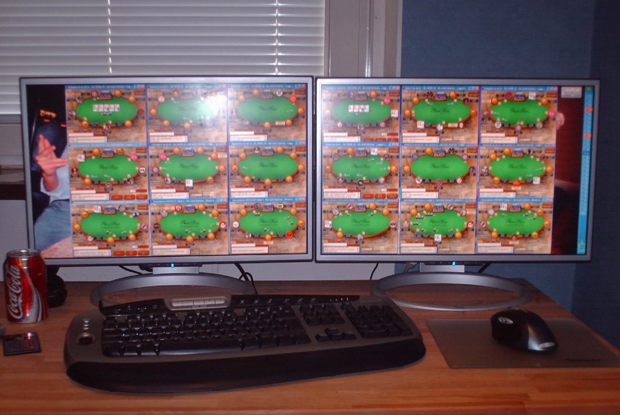
A
shot of the dual-monitor set up for playing
online poker that
Bergman set up in his first apartment while still in
his teens.
"Unfortunately,
the luck didnít last, and I stopped winning,"
Bergman continued. "When money had become my
identity, my burn rate was high, and I had soon
spent all my money on crap and just after graduation,
at 19 years old, I had to move back into my parentís
house." It was a valuable lesson that remains
with him today, superficial things are often
short-lived. However, that early experience of being
on his own and paying his own way did lead Bergman to
decide to skip going to college and dive directly into
the business world in a new search for success.
"Right
after school I started my first company together with
my childhood friend Emil," Bergman said.
"We were actually born in the same hospital on
the same day by parents that knew each other! So, we
have been friends for pretty much as long that itís
physically possible. It was a small web agency and we
didnít reap much success with it. So we started
building affiliate websites for ourselves. From
poker I had gotten a bit into online bingo as well, so
this became our niche. This was still just a
hobby for a couple of years but in 2010, at the age of
22, we decided to take the leap and do it full
time."
While
they were getting serious about the business, Erik and
Emil were still determined to make sure they had fun
along the way. "We were playful with everything
(we even had a ball pit in the office!)", Bergman
recalled. "We tried every strategy we could come
up with and whatever worked we did more of. Bingo
remained our main area at the time, but we also built
sites about loans, business cards, fashion, hotels,
and pretty much everything else."
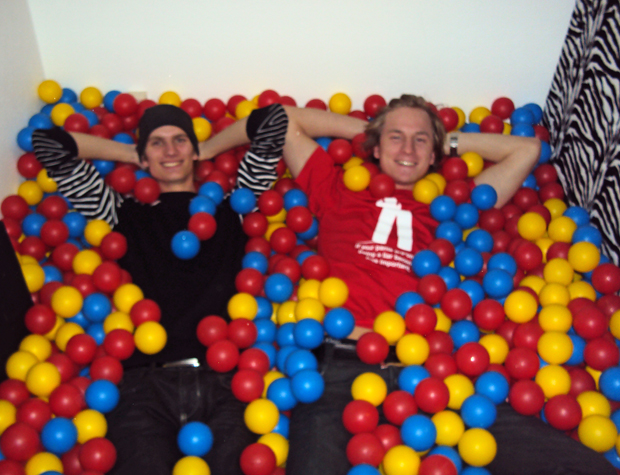
Erik
(right) and Emil in their office ball pit.
All the
while Erik and Emil's network and skill sets kept
growing, so much so they attracted the attention of
investors with deep pockets. "In 2012 we sold
half of the business to an investment company and everything
changed," Bergman said. "We went from having
no employees and no plans to hiring like crazy and
organizing everything. From doing a little bit of
everything to focusing 100% on online casino
affiliation."
Bergman
said the sudden changes made 2013 a very stressful
year, so much so he thought he might break down, but
he hung onto the wild horse and they finally caught up
with the demands of a business that was running so
fast it was hard to keep up with. "2014 and 2015
became really successful years with very high growth
and 2016, on the 11th of February, my 28th birthday,
we took the company public on the Swedish stock
exchange," Bergman smiled. "The market
valued the company at about $200 million!
For me, a guy who had been chasing money all my life
to fit in, this was a huge day! I had finally
reached all my goals. I was so happy, however, the
feeling didnít last very long. Pretty soon I
felt empty and unmotivated instead."
|
That
feeling was the first step in a journey that would
eventually lead to Bergman's acquisition of Great.com.
A lot of people believe that even at $900,000,
Great.com was an excellent buy. When it comes to
domains, Bergman knew what he was doing long before he
began his pursuit of that name. "When it came to domain
names it first started out with actual websites -
small affiliate sites in various segments. At first, I
was only interested in exact match domains for
all the SEO benefits but later on itís been more
about being able to build a big brand with
it," Bergman said.
"In
the beginning it was mainly .se and.nu
which are the top Swedish TLDs. I had bought smslŚn.nu
(meaning "payday loan") for about $10,000
and lŚnapengar.com (meaning "lend
money") for about $3,000. In 2013 I
focused more on the .com side of things and we
bought Thrills.com for
|

|
|
about $40,000.
The prices and the market really interested me so even
if Iíve mainly been on the sideline Iíve been
following the market for years," Bergman noted.
|
Regarding Great.com, Bergman said, "Iíve been
having this idea for a long time that I would like to
build something that can be both commercial and for
charity. Where all profits can be given away. I
wanted something that can work in any industry, be a
name that everyone can spell, have positive
connections to and will remember. I had gone over tons
of options but after I came up with Great.com I just
couldnít let that idea go. When the domain appeared
in the NamesCon auction, Bergman decided it was now or
never. "Iím not sure how long I would have been
able to go in the auction. My mind was really set to
get it, so I probably would have gone higher than
$900,000 if I had to," Bergman said.
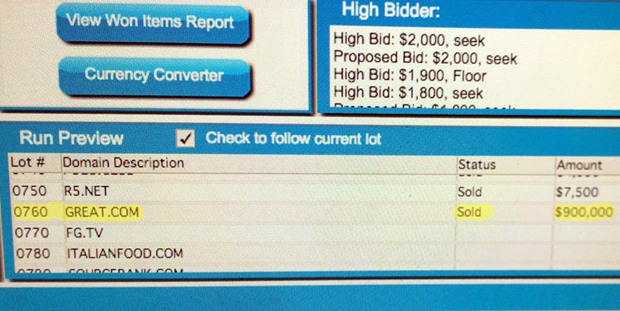
Bergman
snapped this shot of his computer screen right after the
auction
for Great.com ended. He said "my heart was
beating 200bpm at that moment!"
Bergman
remains certain that he made the right choice. After the Ring.com company
was sold to
Amazon for $1 billion Ring.com CEO Jamie
Siminoff, who had paid $1 million for the
Ring.com domain name, estimated the name alone had
been worth as much as $50 million in fueling the
company's growth. "I share his way of thinking," Bergman said. "I believe
that Great.com will have a huge value to my
project - $50 million if not more over time. For me
this will be a life project. I want to do this
for 50 years and with that perspective the investment
isnít that big."
As I
noted earlier, Bergman has not yet settled on final
plans for Great.com but he has a clear concept in
mind. 'This will be a charity project but only in the
sense that all profits will be given away. In every
other sense it will be a proper business, so the name
will be equally important here as if it was a regular
company. It can be thought of as a usual company,
where Iím the only shareholder, I just donate all
the money I earn instead of spending it on material
stuff," Bergman explained.
|

|
While the
nature of the business remains to be determined,
Bergman has settled on the charity that will benefit
from it - IT
for Children - an organization that is
already up and running in Ghana where
it is making a major impact. "The long-term goals
are to have a significant impact on information
technology education in Ghana," Bergman
said. "We want to open more schools around the
country and be able to provide this for as many kids
as possible. My hope for the project is that
we will be able |
|
to add a more
entrepreneurial-spirited education that the
kids can take after a few years with us. The
aim would be to help them start their
own online businesses, maybe with things on Fiverr,
maybe ecommerce, maybe even turn some of them
into domainers. Not just stop at giving
them an education but really giving them an opportunity to earn money
and provide for their families as well." |
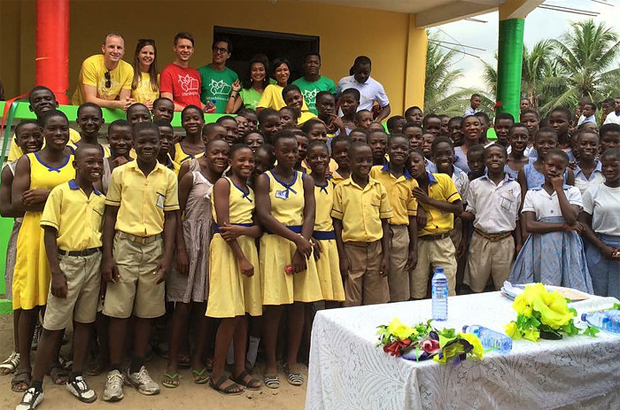
January
2017 opening of the first IT For Children school
building in Ghana.
Bergman
added, "The organization is based out of Sweden,
so in Sweden they do regular collections of used
computers and technology that they ship down to Ghana.
For people based outside of Sweden the easiest way to
contribute is financially and there is a
form on the website where you can easily
make a donation."
As far as Bergman is concerned, his life will be all
about Great.com from now on. He has no interest in
starting any other kind of company from scratch again.
"For me Great.com will be a life project and I
want Great.com to be a life project for anyone else
who gets involve," Bergman said. "That means
that I want to understand what makes people happy
at a workplace and then continuously make sure
that everyone has that. I want to create an
organization that loves what they do, that
feels seen and appreciated, that has all the
responsibility and flexibility they want and where
everything is transparent, from revenues and costs,
down to individual salaries. I want everyone to feel
that this is their purpose in life, this is
their best way to contribute!"

Erik
Bergman speaking to a crowd of enthusiastic teems at a
2017 conference in Sweden.
"Iím not sure how to
create this but I have a very clear vision of what
I want it to become. Anyone who wants to be a part
of this journey is more than welcome to contact
me. If anyone has examples of other
companies doing something similar I would greatly
appreciate hearing about those as well." Bergman
concluded by inviting people to view a personal
video he posted at Great.com
detailing his journey to date and where he hopes to go
from here.
For Bergman good will not be good enough, it has to be
great.
|








